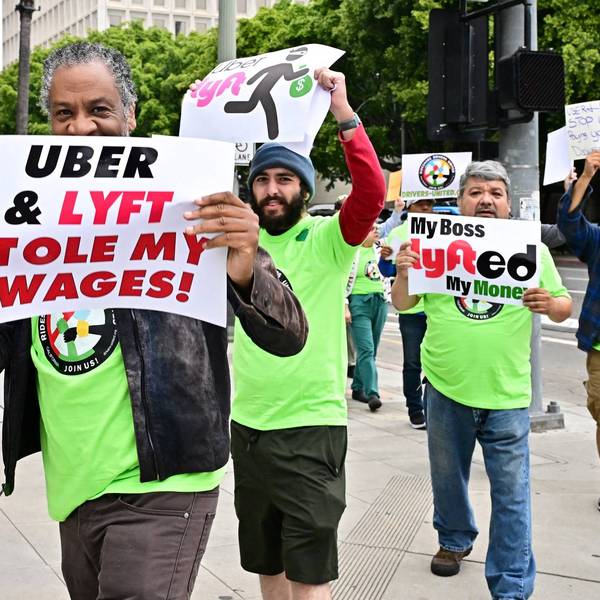
AFL-CIO president Liz Shuler speaks at a rally in Washington, D.C. on February 28, 2023.
Labor Leaders Condemn GOP Fiscal Commission as Anti-Worker 'Power Grab'
"The labor movement stands united in our belief that slashing crucial programs like Medicare and Social Security... will make people poorer, sicker, hungrier and even lose their homes," said AFL-CIO president Liz Shuler.
A coalition of U.S. labor leaders spoke out forcefully on Thursday against the Republican-led push for a "fiscal commission," denouncing the proposal as an attack on Social Security, Medicare, and other programs that tens of millions of current and retired workers depend on to meet basic needs.
Liz Shuler, president of the AFL-CIO, said in a statement that a fiscal commission is a "terrible idea that would push older Americans into poverty, take away people's healthcare, and end up costing the government more."
"The labor movement stands united in our belief that slashing crucial programs like Medicare and Social Security—which millions of hardworking individuals rely on and have contributed to—will make people poorer, sicker, hungrier and even lose their homes; it also would put the pay and benefits for federal workers on the chopping block," Shuler added. "This commission is a power grab that is trying to bypass the regular democratic process by hiding behind closed doors and fast-tracking a plan that escapes public scrutiny and accountability, and rips away the security older people rely on and have paid for."
Other union leaders, including American Federation of Government Employees (AFGE) president Everett Kelley, joined Rep. John Larson (D-Conn.) at a Washington, D.C. press conference on Thursday calling attention to and criticizing the proposed commission, which the Republican-controlled House Budget Committee approved with the support of three Democrats last month.
"Our members know, and they know quite well, what a fiscal commission means, because we have lived through that," said Kelley, pointing to the Bowles-Simpson commission that recommended Social Security benefit cuts in 2010 during the Obama administration.
"The new commission plans mean federal pay freezes," Kelley said. "What do y'all think about that? A commission means retirement cuts. What do you think about that? A commission means sequestration. And yes, a commission means devastating cuts to Social Security and Medicare."
The bill that passed out of the House Budget Committee last month would establish a 16-member bipartisan commission with a mandate to craft reforms to the nation's trust fund programs, including Social Security and Medicare.
If approved by the commission, the recommended reforms would be placed on a fast track in the House and Senate, with no amendments allowed.
During debate over the Fiscal Commission Act last month, Republicans on the House Budget Committee rejected Democratic amendments that would have required the commission to propose changes that would strengthen and secure Social Security and Medicare.
Supporters of the Fiscal Commission Act are hoping to attach the legislation to a must-pass government funding measure that lawmakers are racing to finish by the end of the month.
Larson, a leading advocate of expanding Social Security by requiring the rich to pay more into the program, said during Thursday's press conference that "nothing is more undemocratic" than a fast-tracked vote on policy recommendations crafted behind closed doors by a panel of 16 people.
"We need hearings out in the open on specific proposals so the public can see what's going on and everybody can add to that," said Larson. "We are a body of 435 people. The Senate is a body of 100 people. How about we do something unusual in Congress: we actually vote, actually vote on Social Security and Medicare."
"We know where the American people are," he added. "We don't need a commission."
An Urgent Message From Our Co-Founder
Dear Common Dreams reader, The U.S. is on a fast track to authoritarianism like nothing I've ever seen. Meanwhile, corporate news outlets are utterly capitulating to Trump, twisting their coverage to avoid drawing his ire while lining up to stuff cash in his pockets. That's why I believe that Common Dreams is doing the best and most consequential reporting that we've ever done. Our small but mighty team is a progressive reporting powerhouse, covering the news every day that the corporate media never will. Our mission has always been simple: To inform. To inspire. And to ignite change for the common good. Now here's the key piece that I want all our readers to understand: None of this would be possible without your financial support. That's not just some fundraising cliche. It's the absolute and literal truth. We don't accept corporate advertising and never will. We don't have a paywall because we don't think people should be blocked from critical news based on their ability to pay. Everything we do is funded by the donations of readers like you. Will you donate now to help power the nonprofit, independent reporting of Common Dreams? Thank you for being a vital member of our community. Together, we can keep independent journalism alive when it’s needed most. - Craig Brown, Co-founder |
A coalition of U.S. labor leaders spoke out forcefully on Thursday against the Republican-led push for a "fiscal commission," denouncing the proposal as an attack on Social Security, Medicare, and other programs that tens of millions of current and retired workers depend on to meet basic needs.
Liz Shuler, president of the AFL-CIO, said in a statement that a fiscal commission is a "terrible idea that would push older Americans into poverty, take away people's healthcare, and end up costing the government more."
"The labor movement stands united in our belief that slashing crucial programs like Medicare and Social Security—which millions of hardworking individuals rely on and have contributed to—will make people poorer, sicker, hungrier and even lose their homes; it also would put the pay and benefits for federal workers on the chopping block," Shuler added. "This commission is a power grab that is trying to bypass the regular democratic process by hiding behind closed doors and fast-tracking a plan that escapes public scrutiny and accountability, and rips away the security older people rely on and have paid for."
Other union leaders, including American Federation of Government Employees (AFGE) president Everett Kelley, joined Rep. John Larson (D-Conn.) at a Washington, D.C. press conference on Thursday calling attention to and criticizing the proposed commission, which the Republican-controlled House Budget Committee approved with the support of three Democrats last month.
"Our members know, and they know quite well, what a fiscal commission means, because we have lived through that," said Kelley, pointing to the Bowles-Simpson commission that recommended Social Security benefit cuts in 2010 during the Obama administration.
"The new commission plans mean federal pay freezes," Kelley said. "What do y'all think about that? A commission means retirement cuts. What do you think about that? A commission means sequestration. And yes, a commission means devastating cuts to Social Security and Medicare."
The bill that passed out of the House Budget Committee last month would establish a 16-member bipartisan commission with a mandate to craft reforms to the nation's trust fund programs, including Social Security and Medicare.
If approved by the commission, the recommended reforms would be placed on a fast track in the House and Senate, with no amendments allowed.
During debate over the Fiscal Commission Act last month, Republicans on the House Budget Committee rejected Democratic amendments that would have required the commission to propose changes that would strengthen and secure Social Security and Medicare.
Supporters of the Fiscal Commission Act are hoping to attach the legislation to a must-pass government funding measure that lawmakers are racing to finish by the end of the month.
Larson, a leading advocate of expanding Social Security by requiring the rich to pay more into the program, said during Thursday's press conference that "nothing is more undemocratic" than a fast-tracked vote on policy recommendations crafted behind closed doors by a panel of 16 people.
"We need hearings out in the open on specific proposals so the public can see what's going on and everybody can add to that," said Larson. "We are a body of 435 people. The Senate is a body of 100 people. How about we do something unusual in Congress: we actually vote, actually vote on Social Security and Medicare."
"We know where the American people are," he added. "We don't need a commission."
A coalition of U.S. labor leaders spoke out forcefully on Thursday against the Republican-led push for a "fiscal commission," denouncing the proposal as an attack on Social Security, Medicare, and other programs that tens of millions of current and retired workers depend on to meet basic needs.
Liz Shuler, president of the AFL-CIO, said in a statement that a fiscal commission is a "terrible idea that would push older Americans into poverty, take away people's healthcare, and end up costing the government more."
"The labor movement stands united in our belief that slashing crucial programs like Medicare and Social Security—which millions of hardworking individuals rely on and have contributed to—will make people poorer, sicker, hungrier and even lose their homes; it also would put the pay and benefits for federal workers on the chopping block," Shuler added. "This commission is a power grab that is trying to bypass the regular democratic process by hiding behind closed doors and fast-tracking a plan that escapes public scrutiny and accountability, and rips away the security older people rely on and have paid for."
Other union leaders, including American Federation of Government Employees (AFGE) president Everett Kelley, joined Rep. John Larson (D-Conn.) at a Washington, D.C. press conference on Thursday calling attention to and criticizing the proposed commission, which the Republican-controlled House Budget Committee approved with the support of three Democrats last month.
"Our members know, and they know quite well, what a fiscal commission means, because we have lived through that," said Kelley, pointing to the Bowles-Simpson commission that recommended Social Security benefit cuts in 2010 during the Obama administration.
"The new commission plans mean federal pay freezes," Kelley said. "What do y'all think about that? A commission means retirement cuts. What do you think about that? A commission means sequestration. And yes, a commission means devastating cuts to Social Security and Medicare."
The bill that passed out of the House Budget Committee last month would establish a 16-member bipartisan commission with a mandate to craft reforms to the nation's trust fund programs, including Social Security and Medicare.
If approved by the commission, the recommended reforms would be placed on a fast track in the House and Senate, with no amendments allowed.
During debate over the Fiscal Commission Act last month, Republicans on the House Budget Committee rejected Democratic amendments that would have required the commission to propose changes that would strengthen and secure Social Security and Medicare.
Supporters of the Fiscal Commission Act are hoping to attach the legislation to a must-pass government funding measure that lawmakers are racing to finish by the end of the month.
Larson, a leading advocate of expanding Social Security by requiring the rich to pay more into the program, said during Thursday's press conference that "nothing is more undemocratic" than a fast-tracked vote on policy recommendations crafted behind closed doors by a panel of 16 people.
"We need hearings out in the open on specific proposals so the public can see what's going on and everybody can add to that," said Larson. "We are a body of 435 people. The Senate is a body of 100 people. How about we do something unusual in Congress: we actually vote, actually vote on Social Security and Medicare."
"We know where the American people are," he added. "We don't need a commission."

